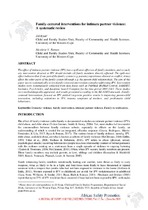| dc.description.abstract | The effect of intimate partner violence (IPV) has a spill-over effect on all family members, and as such,
any intervention directed at IPV should include all family members directly affected. The spill-over
effect indicates that if one part of the family system (e.g. parents) experiences discord or conflict, it may
affect the other parts of the family system (through e.g. the parent-child relationship). The aim of this
paper was to systematically review family-centered interventions aimed at addressing IPV. Intervention
studies were systematically collected from data bases such as PubMed, BioMed Central, SABINET,
SocIndex, PsycArticles, and Academic Search Complete for the time period 2005-2015. These studies
were methodologically appraised, and results presented according to the RE-AIM framework. Familycentered interventions focused on IPV yielded long-term positive results in improving parent-child
interaction, including reductions in IPV, trauma symptoms of mothers, and problematic child
behaviours. | en_US |

